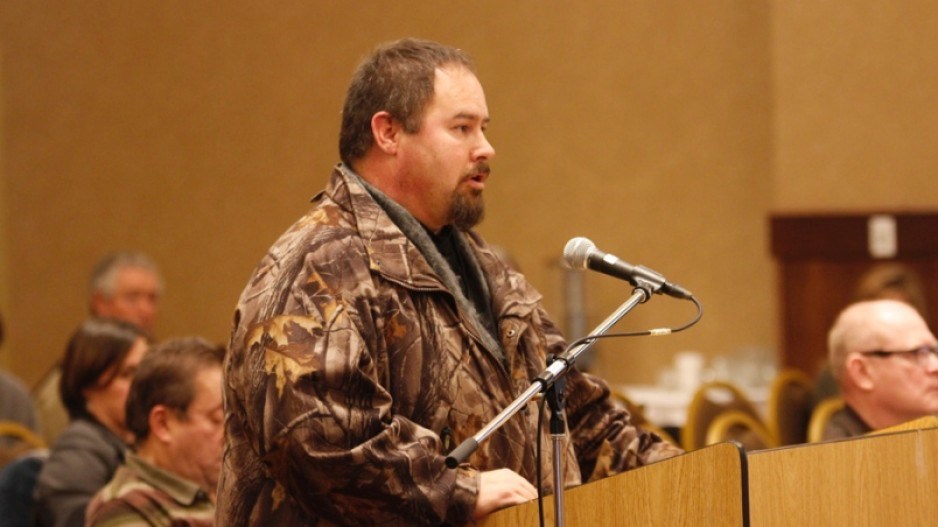B.C. business and building trades groups welcomed news that the Site C dam will be completed, while the environmental groups, Treaty 8 First Nations and the Green Party slammed the decision and vowed continued opposition.
Less than an hour after Premier John Horgan announced his government will complete the dam, now estimated to cost $10.7 billion, the West Moberly and Prophet River First Nations announced they will seek a court injunction against the project.
The two First Nations are signatories to Treaty 8, and have vowed to launch a treaty infringement case, something the Sierra Club BC said it would be supporting.
West Moberly Chief Roland Wilson said a BC Utilities Commission (BCUC) final report on Site C should give them ammunition with the courts.
“With the BCUC’s report in hand, we’re confident that the court will grant our injunction,” Wilson said.
“Usually, courts are reluctant to hold up a project because of economic impacts. But with the BCUC’s report in hand, the court can actually save British Columbia billions of dollars, and protect our constitutional rights at the same time.”
In deciding to complete the dam project, the NDP now own a share in "a B.C. Liberal boondoggle," Green Party Leader Andrew Weaver said
Weaver suggested the B.C. government could have absorbed the $4 billion debt from cancelling Site C, had it not assumed $4.7 billion in debt from removing bridge tolls.
“We find out now that there is no more room for more debt without trouble and concern about credit ratings,” Weaver said. “They made a choice to allow the $4.7 billion debt from the Port Mann and Golden Ears bridges on the provincial book as opposed to stopping Site C.”
Weaver has suggested there should be a recall petition against NDP Energy, Mines and Petroleum Resources Minister Michelle Mungall, who had been an opponent of the dam project prior to becoming minister of Energy, Mines and Petroleum Resources. However, Weaver said he would not participate in a recall campaign, saying it would be "inappropriate." He said he does not sign petitions, as an elected leader "as a matter of principle."Weaver himself has changed his mind on the Site C dam. Prior to entering politics, he supported the project, and only changed his stance after becoming a the leader of the Green Party. He has defended that change of position based on the fact the cost of wind power has since come down drastically, while the budget for Site C has continuously escalated.
Although “disheartened” by the NDP government’s decision, Weaver, whose three-member caucus has the power to bring the NDP government down, has given no indication he plans to do so.
Premier John Horgan addressed the question when speaking to reporters Monday December 11, saying that Weaver has said both privately and publicly that moving Site C forward will not trigger a crisis for his government. The NDP was only able to form government with the cooperation of the Green Party, which could at any time could withdraw its support and bring the government down.
"I'm fairly confident that, although Mr. Weaver and his colleagues disagree with us on this decision, that it won't have an impact on the long-term viability of the government," Horgan said.
Weaver confirmed that was the case.
"Does this mean we're going to topple the government?" he said in a press conference. "No. I've signaled that publicly for quite some time."
Business and labour groups representing trades workers applauded the decision to complete the dam.
Tom Sigurdson, executive director of the BC Building Trades, said he hopes to see some kind of project labour agreement on future contracts on the dam, such as the work on the spillway and generating station.
According to the BC Building Trades, just 31% of workers on the dam project from the local area, 20% are from outside BC., and only 2% are apprentices.
“This is B.C.’s project, and it should benefit B.C. workers,” said Wayne Peppard, spokesman for the Allied Hydro Council of B.C.
“Now that the decision has been made, we want to move forward and we want to move B.C. forward using the skilled B.C. workers and apprentices that have been building this province for 50 years.”
Business groups pointed to B.C.’s legacy of low power from hydro dams in the development of industry, and said completing Site C continues giving B.C. a competitive advantage.
“In the long-run, Site C’s affordable energy is a huge competitive advantage for business in the province,” said Val Litwin, CEO of the BC Chamber of Commerce. “B.C.’s hydroelectric system gives businesses and residents certainty that reliable and clean power will be available when it is needed.”
“For decades, our province has benefited from reliable hydroelectric power,” said Iain Black, CEO of the Greater Vancouver Board of Trade.
“In fact, many resource industries in British Columbia today are built on this competitive advantage, and many new industries, such as the burgeoning tech sector, stand to benefit moving forward. As our economy continues to grow and change, building reliable, new energy infrastructure is critical to provide the certainty that our industries and businesses need to invest and expand.
“Assuring a domestic source of clean, reliable hydroelectric power helps secure our energy system for the growth of businesses and sectors of the Lower Mainland and provincial economy for decades into the future.”




